

UNFIXED: Photography and Postcolonial Perspectives in Contemporary Art. Contemporary Art and Theory: Postcolonialism. Postcolonial: return to sender. Orientalism is not racism. Romanticised but not out of contempt ...

The Snake Charmer by Jean-Léon Gérôme A woman wraps a giant snake around her nude form as north African men in a picturesque variety of costumes look on in J-L Gérôme's 19th century painting The Snake Charmer. She stands on a Turkish carpet; the entire scene is permeated by sexy blue light reflected off a tiled wall. This is the "orient" as imagined by a 19th-century European.
You can see why Penguin in the 1980s chose it as a cover image for the paperback of the critic Edward W Said's famous book Orientalism. The appositeness of Orientalism, first published in 1978 and one of the most influential books of the last 30 years, to the present moment is obvious. Let me be frank. Orientalism in western art. Postcolonial art criticism.
Postcolonial Theory & Literary Studies at UCLA. The Renewed Art of Embroidered Photographs. As a snapshot collector, I often come across photographic images that have been altered in some way.
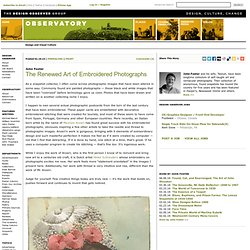
Commonly found are painted photographs — those black and white images that have been “colorized” before technology gave us color. Photos that have been drawn and written on is another collecting niche I enjoy. I happen to own several actual photographic postcards from the turn of the last century that have been embroidered. These paper cards are embellished with decorative embroidered stitching that were created for tourists, and most of these seem to have come from Spain, Portugal, Germany and other European countries.
More recently, an Italian born artist by the name of Maurizio Anzeri has found great success with his embroidered photographs, obviously inspiring a few other artists to take the needle and thread to photographic images. Modern Art in West Asia: From Colonial to Post-colonial Period. Old Baghdad, 1972 Hafiz al-Droubi (Iraqi, 1914–1991) Oil on canvas, approx. 66 7/8 x 78 3/4 in. (170 x 200 cm) Baghdad Museum of Modern Art (listed as missing during 2003 invasion) In 1942, Hafiz al-Droubi became the first artist to open a freelance studio in Baghdad.
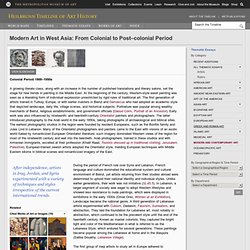
1960 - Age of Post-Colonialism. Analysis of postcolonial art. Postcolonialism. Colonialism background[edit] In La Réforme intellectuelle et morale (1871), the Orientalist Joseph-Ernest Renan, advocated imperial stewardship for civilising the non–Western peoples of the world.
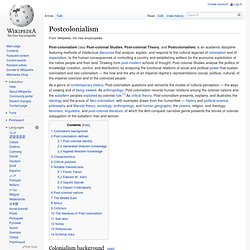
Colonialism was presented as “the extension of Civilization”, which ideologically justified the self-ascribed superiority (racial and cultural) of the European Western World over the non-Western world, which Joseph-Ernest Renan espoused in La Réforme intellectuel et morale (1871), whereby imperial stewardship would effect the intellectual and moral reformation of the coloured peoples of the lesser cultures of the world. That such a divinely established, natural harmony among the human races of the world would be possible, because everyone — colonizer and colonized — has an assigned cultural identity, a social place, and an economic role within an imperial colony; thus: Post-colonialism defined[edit] The British Empire; the contemporary British Overseas Territories are underlined.
Critical theory. 22. Post-Colonial Criticism. UNFIXED: Photography and Postcolonial Perspectives in Contemporary Art. Www19.homepage.villanova.edu/silvia.nagyzekmi/teoria/childs postcolonial.pdf. Www.thomaserben.com/wp-content/uploads/YNA_UNFIXED_2012.pdf. Www.upf.edu/forma/_pdf/vol04/forma_vol04_07callia.pdf. Reading the New South Africa: Postcolonialism and Post-Apartheid Rhetoric. NOTE: This essay was written in 1996.
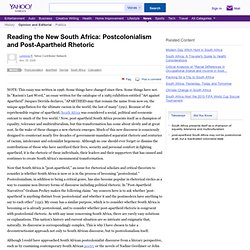
Some things have changed since then. Some things have not. In "Racism's Last Word," an essay written for the catalogue of a 1983 exhibition entitled "Art against Apartheid" Jacques Derrida declares, "APARTHEID-may that remain the name from now on, the unique appellation for the ultimate racism in the world, the last of many" (291). Because of the reprehensible regime of apartheid, South Africa was considered a social, political and economic outcast to much of the free world.1 Now, post-apartheid South Africa presents itself as a champion of equality, tolerance and multiculturalism, but this transformation has come about slowly and at great cost.
In the wake of these changes a new rhetoric emerges. Now that South Africa is "post-apartheid," an issue for rhetorical scholars and critical theorists to consider is whether South Africa is now or is in the process of becoming "postcolonial. " Apartheid had become a synecdoche for South Africa itself. Guide to Research in Post-Colonial Theory. In recent years, post-colonial theory has posed some of the most far-reaching questions for literary scholars and students alike.
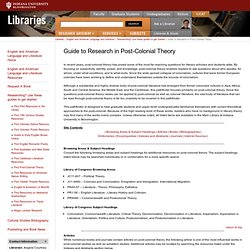
By focusing on subjectivity, identity, power, and knowledge, post-colonial theory enables readers to ask questions about who speaks, for whom, under what conditions, and to what ends. Since the wide-spread collapse of colonialism, cultures that were former European colonies have been working to define and understand themselves outside the bounds of colonialism. A Postcolonial Aesthetic? Australian, South Asian and African Literature and Film, Arts, Monash University. Sigiriya Fresco, 5th Century Sri Lanka, Photo by Jerzy Strzelecki, Creative Commons Licensed.
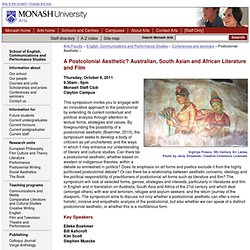
Thursday, October 6, 2011 9.30am - 6pm Monash Staff Club Clayton Campus This symposium invites you to engage with an innovative approach to the postcolonial by extending its current contextual and political analysis through attention to textual forms, strategies and values. By foregrounding the possibility of a postcolonial aesthetic (Boehmer, 2010), the symposium seeks to develop a body of criticism as yet unchartered, and the ways in which it may enhance our understanding of literary and cultural studies. Can there be a postcolonial aesthetic, whether based on western or indigenous theories, within a debate so enmeshed in politics?
Does its emphasis on art forms and poetics exclude it from the highly politicised postcolonial debate? Key Speakers. Redirect Notice.